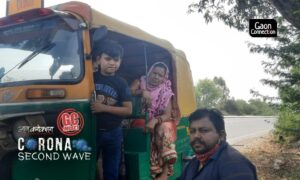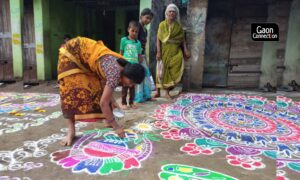It’s quite common to see young children begging at signals or crossings. We either give them some change, if it’s handy, or we simply drive past them. But Allahabad-based Abhishek Shukla did something unusual.
In 2016, when he was waiting at a signal, a girl came up to him and asked for money. He couldn’t ignore her for long and decided to visit the basti (slum) where she lived. That day changed Abhishek’s life and lives of hundreds of children when he decided to take them under his wings and educate them.
“The 10-year-old girl told me she lived with her father and looked after her brother, 4. I thought she was lying and so I visited her basti. I was shocked to see that there were many girls like her in that slum who were beggars and miles away from any form of education. I decided to do something for these kids,” said Abhishek, who was then preparing for his civil services exam.
That’s how ‘Shuruaat – Ek Jyoti Shiksha ki’ was born. A team of 20 volunteers, along with Shukla, who is 28-year-old now, conducts morning and evening classes for children living in slums. They conduct four classes – two in slums and one at a footpath. If you happen to catch a train from Allahabad railway station, you will find a class in progress on platform number one.
“Biggest challenge was to convince their parents”
Initial days were full of struggle. The biggest challenge in front of Abhishek was to convince the parents to send their children to study. “They are not educated so they don’t understand the importance of education. They were happy earning Rs 250-300 per day. That money was enough for them to buy basics and alcohol. They expected their children to do the same. The girls living in that basti had no hope. Their parents threatened to marry them off. They would argue that even the educated don’t get jobs so why should they educate their children,” said Abhishek.
He went back and introspected. He realized that though the kids managed to earn Rs 150-200 a day, their lives were not going to change. He also wondered why were the students dropping out of the government schools.
“I realized that these schools are very active in March-April when they have to show enrollment figures. But after that, the staff gets so occupied in doing clerical jobs for the school that they are not able to pay any attention to children. They start dropping out by June-July,” said Abhishek, who now is pursuing Masters in social work.
“The kids thought I am going to distribute gifts, so they came”
When Abhishek visited the basti the next day, many children came because they thought he was going to distribute something. Gradually they started dropping out. But he persisted and didn’t stop going to the basti. Eventually, when parents realized he was serious, and “not there to click pictures of their slum, like it usually happens”, they started sending their children to school.
“These kids are different. Most of them have never been to school. Some of them are beggars and drug addicts. They are not ready for books. Initially, we play with them. We let them mingle. We give them time and space to adapt. Initial days were full of struggle, but today 65 children come to study in the same basti where we started; 90% of them are girls.
Most of our students who were addicts have given up on drugs. These are some of the small victories for us,” said Abhishek, who was talking to us over the phone from his “school” at the Allahabad platform. The conversation was getting interrupted due to incessant railway announcements and the blaring of train horns. A class was in progress nevertheless and one could hear the chatter of enthusiastic kids.
“Many volunteers joined me”
When the number of kids kept going up, it became a problem for Abhishek who until then was spending money that he earned by taking tuitions to buy them books and stationery. But he didn’t want to give up on the idea of providing quality education to deprived kids.
He needed volunteers, so he posted for help on social media. Initially, he didn’t get any response, but gradually many volunteers joined him. Most of them are students. “They take the time off their busy schedule and come to teach. They even spend their pocket money to buy things for these children.” Some of the older students have started sharing the burden and teach younger kids.
“We realized they need formal education”
Among the kids who came to Abhishek, 50% had never been to school. The rest were dropouts.
“We soon realized that we were spending just two hours with these kids, but they were spending the rest of the 22 hours in the world which was dark and depressing. Initially, we didn’t get the desired results. We changed our strategy and launched ‘dijiye sirf ek bachche ko shiksha taaki koi bachcha na maange bhiksha’.
We realized it is important that they get a formal education. Spending money from our pockets, we enrolled some students in a government school. The result we got was incredible. Those 13-14-year old girls were first-generation school-goers and yet scored more than 90% in Maths. This motivated us. Now many of our kids are studying in different schools and are scoring well in 10th and 12th standard,” said Abhishek.
“Our oldest kid is a 70-year-old grandmother”
Many children in the age group of 4-19 attend classes conducted by Abhishek and the group of volunteers. While the youngest are in playgroup, the older ones are pursuing their graduation.
“When we had to send children to school, we faced a cash crunch. So, I again posted on social media and asked people to donate money equivalent to what they spend on chai every day. I requested them to donate as little as Rs 10 and made them understand that education is the only way to keep these children away from crime as such kids tend to become criminals,” said Abhishek.
Among many of the success stories is that of Neha, who joined Shuruaat when she was in 10th standard and is now pursuing her graduation in microbiology. She is the daughter of a vegetable vendor. “I want to pursue my M.Sc and will continue teaching kids at Shuruaat,” said Neha. Similarly, Dheeraj, who lives 50 kms from Allahabad, had to quit school after 8th standard as his mother, who works as a house-help, could not afford to educate him.
“His teacher requested us to help him as he had the potential. When he appeared for an entrance test for school admission, he stood 25th among 1,000 students and secured 84% in 10th standard. This year has been special for Shuruat as five students have scored more than 70% in 10th standard.
Talking about the challenges, Anjali Singh, a volunteer with Shuruat, who is pursuing post-graduation in social work, said: “As of now we are sponsoring the education of these kids from our pockets. We want to make people aware that instead of giving these kids money, they should sponsor their education. Rs 250-300 may not be a big amount for many and we want this message to go out.”
Another volunteer, Pooja Singh, who is pursuing her B.Ed, said: “They all want to learn. Some of them are very bright. Yes, it’s a challenge to teach those who have never been to the school, but we give them enough time so that they get used to the idea of education. We start teaching them only when they are ready. It’s difficult, but certainly not impossible.” Which is true. After all, the oldest student of Shuruat is a 70-year-old lady who is learning how to read and write.
“She used to come to drop her grand-daughter. She told me once that she was duped and her property was taken away because she couldn’t sign on some documents; the reason why she wanted to learn. She was hesitant at first, but I encouraged her,” said Abhishek.
“These are the things that keep me going. When I started this, it was a part-time thing for me. But I gave up on my civil services preparation just for this. Now I am fully dedicated to Shuruat. In the coming years, I want Shuruat to be a full-fledged school where these kids living in slums would be able to study free of cost. And I will make sure that our school will not have a high number of dropouts as is the case with government schools,” said Abhishek.



















